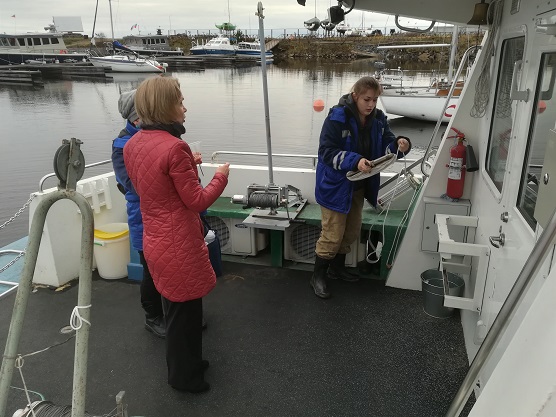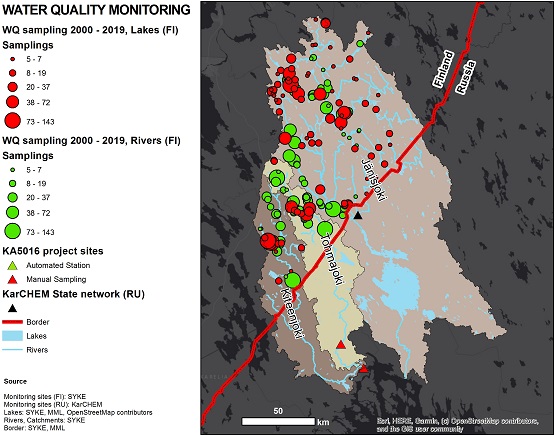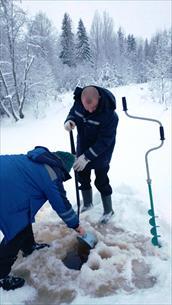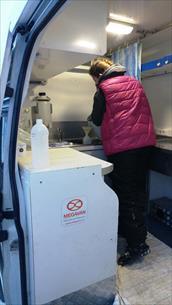
The compatibility of Finnish and Russian monitoring data has been improved by taking samples together and comparing the countries' water quality analyzes. Here we are leaving for sampling for Lake Ääninen with Russian colleagues. @ Photo: Alexander Berdino
Cooperation between Finland and Russia in monitoring Karelian waters has yielded results
In the Eco-bridge project, monitoring data of Karelian waters and, for example, transboundary soil and land use data have been compiled. A new Internet platform, from which water users will receive up-to-date information on water and air quality in the area, is now accessible to all project partners.
As part of neighboring area co-operation, the Finnish Environment Institute (SYKE) has promoted water quality monitoring with the Russian Karelian water authorities.
As a result of the cooperation, an Internet-based tool on water monitoring sites and monitoring results is available for partners. In the next steps, the platform and the information content presented in it will be further developed and the product will be opened to the public.
The map data includes, for example, hydrological stations and water quality observation points, as well as land use and soil data for the area. In the future, water users will receive up-to-date information on water quality in the area from the service.
Comparing the monitoring data is challenging
The challenge in the project has been to ensure the best possible compatibility and comparability of Finnish and Russian monitoring data. Compatibility has been improved by taking samples together and comparing water quality analyzes between countries.
Study trips to SYKE's laboratory in Helsinki and to the laboratory of the Russian State Authority, the Hydrometeorological and Environmental Monitoring Center of the Republic of Karelia (KarCHEM) in Petrozavodsk, increased understanding of, for example, sampling quality control, analytics and monitoring data management.
The water status assessment criteria and classification systems used in Finland and Russia differ. In border areas, it would be necessary to coordinate them in the future. On the Russian side, the challenge is also the inadequate delimitation of catchment areas and the inaccuracy of land use classification. The harmonization of land use and soil categories would also promote cross-border cooperation.

Water quality monitoring sites of the Eco-bridge project in three catchment areas in Finland and Russia.
New measuring equipment was acquired for both Russia and Finland
During the project, KarCHEM equipped four automatic water quality monitoring stations in the rivers flowing into the northeastern part of Lake Ladoga. SYKE offered its know-how in purchasing equipment. SYKE also translated the guide on quality assurance of results into Russian.
On the Finnish side, a passive collector continuously measuring phosphate phosphorus was procured from Luode Oy for trial use. The findings showed that the variation in phosphate phosphorus concentration over time is significantly greater than that found by conventional measurement. However, the results were comparable to those measured by the traditional method.
SYKE's participation in the project produced the following results:
- Comparison of water analyzes of joint sampling
- Descriptions of water monitoring networks on both sides of the border
- Understanding of the storage, distribution and usability of monitoring results
-
Guidelines for Continuous Water Quality Measurements (Russian translation)
-
Description of flow measurement methods in Finland
- Advising on the purchase of automatic meters for the Russian side
- Processing of map data into a common user interface
- Water quality monitoring data from the Finnish side from three stations via the interface
- Experimentation of a new continuous field meter in the measurement of phosphate phosphorus
- Recommendations for further development for monitoring water quality and quantity on the Russian side
The Finnish Meteorological Institute renovated and modernized its air quality station in Pötsönvaara, North Karelia, close to the national border, which also produces reference data for the Russian side.
Final report
Karelia CBC program
The Eco-bridge project was part of the Karelia CBC program (code KA5016). The aim was to strengthen the environmental awareness of citizens, authorities and public organizations, and to harmonize approaches and principles of environmental monitoring in Finland and Karelia. The two-year Eco-bridge project ended in September 2020.

Water sampling at River Tohmajoki in January 2019.
|

Splitting the sample for intercalibration by both partners.
|
More information
Limnologist Sari Mitikka, Finnish Environment Institute SYKE, firstname.lastname@ymparisto.fi
Hydrologist Sirkka Tattari, Finnish Environment Institute SYKE, firstname.lastname@ymparisto.fi